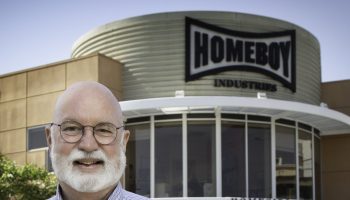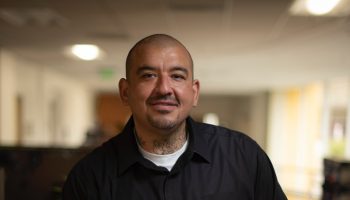MAX ZAMBRANO – STAFF WRITER
Fr. Greg Boyle was in Bolivia when he had an experience, one that prompted him to ask his church to place him in the poorest parish in Los Angeles. There, six gangs were at war with each other.
He wanted to flip these people’s lives around. So he founded Homeboy Industries, an organization that 30 years later is now the largest gang rehabilitation and reentry program in the world, according to its website.
At 1 p.m. Thursday, Jose Arellano and Steve Avalos, co-directors of case management and navigation at Homeboy Industries, shared their stories of life in prison and gangs, to their turnaround through Homeboy. Their lecture, “The Power of Empathy: Live It to Create it,” was the final installment of the Week Six Interfaith Lecture Series themed “Building a Culture of Empathy.”
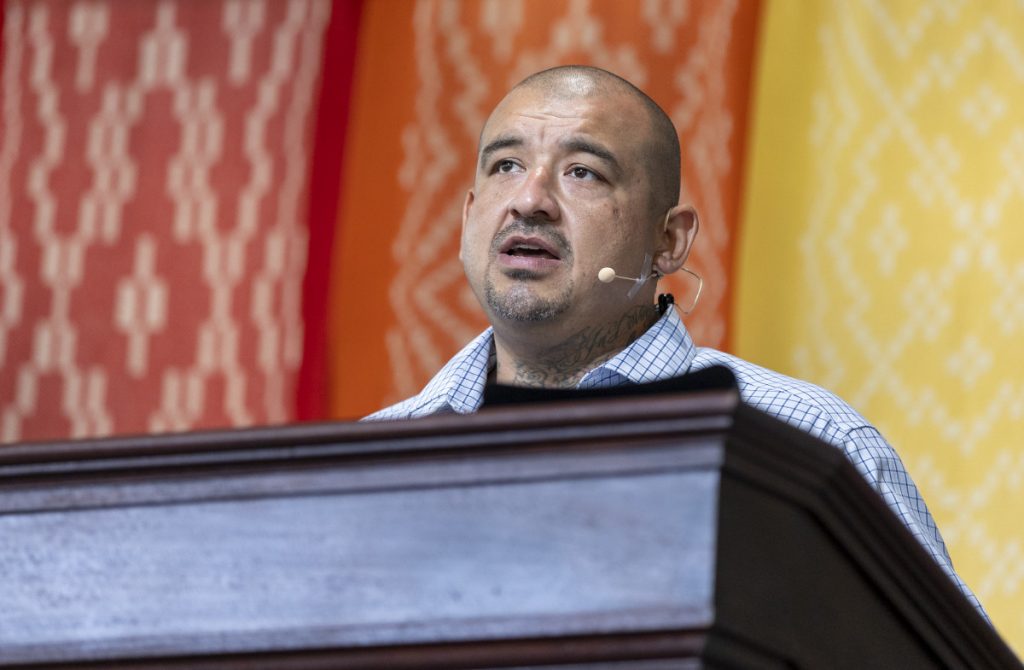
Jose Arellano
As a kid, Arellano loved going to school. He did really well, too, and was placed in the Gifted and Talented Education Program.
His home life was the polar opposite.
Most of his family were involved in gangs all his life, including his mother and uncles, he said. When they partied all night and slept the next day, it was Arellano getting himself and his four younger siblings ready for school.
“That was my life experience growing up,” he said.
He had one older cousin who looked out for him, he said. When they were 11, they made a pact in his grandmother’s backyard.
“ ‘No matter what happens, you and me will never get jumped into the hood,’ ” he said. “He reached out his hand, and I shook his hand. I made that promise.”
The summer before junior high school, when Arellano was 12, his mom got addicted to methamphetamines.
“We became more and more poor,” he said. “Lights were getting turned off; even the water got turned off.”
Arellano and his cousin would stay out until 1, 2 a.m., maybe later — nobody checked. That summer, though, his cousin broke their pact and joined a gang.
“He didn’t consult me, he didn’t tell me he was considering it,” Arellano said. “From one moment to the next, he was a gang member. We never talked about it.”
So Arellano sought refuge at a nearby friend’s house, which was much more stable. He would stay so late, in a home with a mother, father and food, the mother would have to make him leave late at night.
One night, Arellano went and knocked on the door because he couldn’t stand being home. Someone came to the peephole, but didn’t open the door. He tried knocking on the window, and he was greeted by a living room light and TV, both switched off. Nobody who would let him in.
“I remember just feeling so broken and hopeless — and above everything, I felt hurt,” he said.
Back at home, a hub for gang members, he said a couple of them asked if he wanted to join. Before that night, he always had an excuse to refuse — school being one, playing the trumpet another.
“I remember feeling so hurt — my mother is in the streets on meth, my cousin who protected me and is like a brother to me is now gangbanging, and this house that I frequent, they don’t want me there anymore,” he said.
Arellano was out of excuses. He responded instantly.
“Yeah, I’ll get in tonight,” he told them.
They took him across the street, and they beat him.
“They punched me, and when I fell they kicked me and they continuously beat on me,” he said. “After they beat on me, they embraced me and they hugged me and they told me things like, ‘I love you, I got you.’ ”
One of them went to get him some pants. They were three sizes too big for Arellano, but he wore them for a month straight, he said. He felt like someone was looking out for him.
Eight months later, the reality of gang life hit home. Arellano’s cousin, who made a pact they would never get involved with gangs at 11, was dead at 14, murdered with a 12-gauge shotgun.
“Life, for me, became real at that time,” Arellano said. “I felt like death was around every corner.”
He couldn’t talk about his devastation, though. He couldn’t talk about how he missed playing with toys with his cousin when they were hiding in their rooms from the gang, hiding that they weren’t yet grown.
Arellano grew accustomed to it. He said he embraced the pattern of surviving day-to-day.
When he turned 15, Arellano went to juvenile hall for the first time for selling drugs. When he was 16, he went back, this time for two years. He saw how other moms would come and visit their children, and he began to resent his own mother.
“I just felt, ‘Damn, my mom doesn’t care about me,’ ” he said. “ ‘She doesn’t come to visit me.’ ”
He said staff during those years would come to his cell, take his underwear and throw it so he’d have to walk in front of everyone to get it. His early embarrassment turned into embracing the experience, one of many that he said shaped his self-perception during that period.
He got out, and went back in, at 18, staying until he was 22. He didn’t hit 23 before he was back again.
“I felt I had no reason to change, and I wasn’t going to change,” he said. “I accepted my fate. I was going to die like this.”
Arellano’s relationship with his mother became completely nonexistent, he said. He told people he didn’t even have a mom.
During Arellano’s last term in prison, his mom died as a result of her drug addiction.
Locked in solitary confinement, Arellano looked at his small, square mirror.
“I asked myself, ‘Who the hell are you, and how did you get here?’ ” he said to his fully-tattooed reflection.
Arellano first heard of Boyle and his efforts while in prison, but he said it was hard to believe any stories told in the prison yard. Eventually, though, he got out, and stayed out.
He was working odd jobs, driving across town to work four-hour shifts at various places while on high-control parole. His father-in-law told him about Homeboy Industries, so Arellano called and got an interview immediately.
It was four quick questions. First, the interviewer asked if Arellano had ever been locked up, then asked if he was even involved in a gang. Then he asked if he was on probation or parole.
“I’m like, ‘What kind of questions are these?’ ” he said, drawing a laugh from the audience.
Finally, he asked if he had any tattoos. Something in Arellano told him to be honest the entire time.
“He said, ‘Alright we’ll give you a job,’ ” Arellano said, hands in the air met with a now echoing laugh across the Amp.
When he arrived and filled out paperwork, Arellano was incredibly off-put by all of the gang members he saw. He wanted no part of them.
One, who had the most tattoos Arellano had ever seen covering his head, arms and eyelids, approached him. Arellano’s heart was racing.
The man simply stuck out his hand, introduced himself, and asked Arellano if he wanted any water.
“I remember thinking, ‘What is this place? Gang members offering you water?’ ” he said.
These experiences continued. Arellano found a welcoming home.
He ended up finding his little brother, who was then 14, and took him in. He was extremely quiet, Arellano said, only really expressing himself physically and violently. With permission from Boyle, Arellano got his brother a part-time job and enrolled him in high school.
The two shared clothes, transferring attire each day. People noticed, and one day Boyle called them into his office. He handed them two Sears cards, and told them to go buy some new clothes.
Arellano was always taught, and thus taught his brother, to never accept anything from anyone because they would expect something in return. Similarly, the two were taught never to cry because it showed weakness, something that someone could use against them.
When they got to the car, Arellano turned to his brother, who was sobbing uncontrollably, he said.
“Why the eff do they care about us?” Arellano said about his brother’s response.
He didn’t have the words then to tell him why, although he knew it was because he was deserving and because he mattered, Arellano said. This was when he knew he wanted to stay involved in Homeboy Industries — to give these experiences to others like him.
“It’s my honor to be able to continue to be there now in a leadership position, to help create experiences that help people see the truth about their lives,” he said. “That they’re exactly what God had in mind when God created them. That they’re worthy no matter what they’ve done or what they’ve been through.”
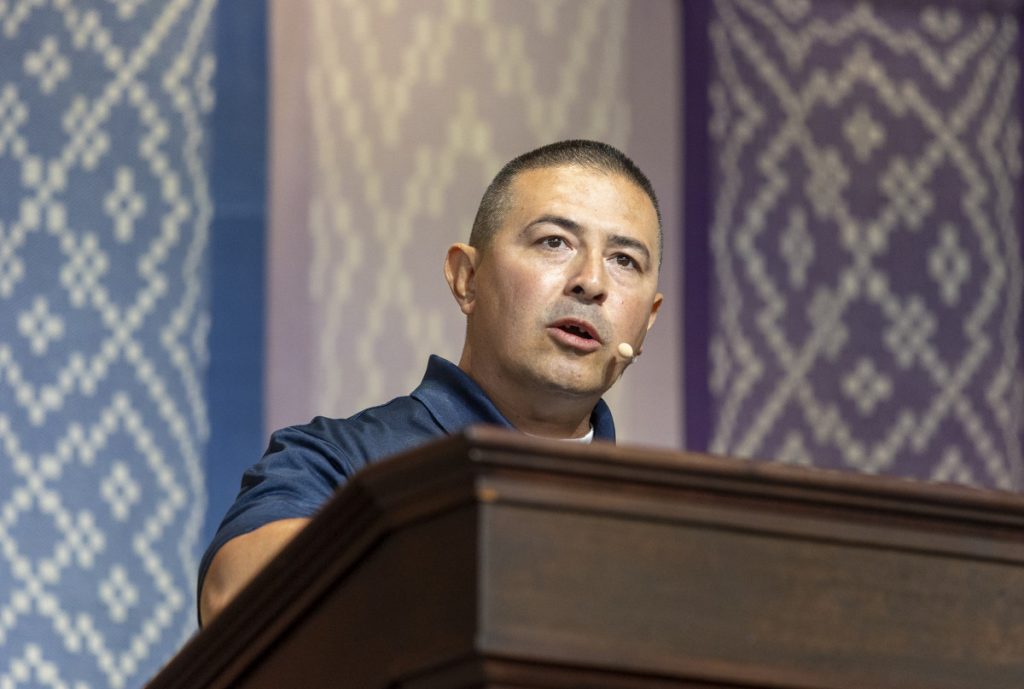
Steve Avalos
Homeboy Industries was pitching itself in a contest where the winners would receive $1 million.
Avalos was there, along with others from Homeboy and the community. While talking to another man, Avalos felt something was familiar.
He asked if he was a judge, and the man said yes. He asked for his name, and it was confirmed.
“My heart dropped,” Avalos said. “I said, ‘I think you let out my father.’ ”
It was true. That same judge let Avalos’ father out of prison on compassionate release. After 34 years in prison, serving a life sentence, Avalos’ father was dying. The judge allowed him to go home.
His father was released one morning at 10 a.m. Twelve hours later, sitting on the couch with his wife, Avalos’ mother, he died.
Avalos thanked the judge for making the controversial decision. The judge asked how his brother was doing, and Avalos said great, he had just graduated from Yale University.
“He said, ‘No, the one with life in prison,’ ” Avalos said.
He was asking about Avalos, not knowing he was speaking directly to him. Upon realization, the two hugged.
“The power of empathy is beyond what we can ever imagine,” Avalos said.
Like Arellano, Avalos never saw himself joining a gang, despite his entire family being involved.
“It’s a lot of pain, a lot of hurt, a lot of betrayal, a lot of violence,” Avalos said. “I didn’t want nothing to do with that.”
Before he was born, Avalos’ biological father was murdered. Soon after, so was his mom’s sister. At a barbeque one day, his uncle was shot eight times. He still doesn’t like parties.
Avalos would go to the baseball field so he could escape.
“If I stayed on the baseball field, I didn’t have to be at the house,” he said.
At home, Avalos’ family slept on the floor in case of drive-by shootings. The outside lights stayed on to see who was coming, and the inside lights stayed off so nobody could see inside, he said.
The summer Avalos was 11 years old, his older brother, who had joined a gang a couple years prior, was murdered at 15.
“I remember thinking to myself, ‘Maybe that’s just life,’ ” he said. “Maybe that’s just the way life is for some of us. I remember shaving my head and saying, ‘OK,’ and giving up and becoming a follower.”
Prison was normal for Avalos, because visitation was allowed five days a week. The only way he avoided visiting his stepfather was if he was playing baseball, he said.
When he was 14, his mother gave him an ultimatum. He could leave the gang, or leave home. She couldn’t see it through any longer, he said.
“I don’t know if you’re going to be behind the gun or in front of the gun, but I’m not OK with it anymore,” she told him.
Avalos left home. Three years later, he was sentenced to life in prison.
“I had no empathy,” he said. “I had a warped way of thinking. I belonged in prison.”
He compared his emotions to being inside watching a storm with pouring rain and blustery winds.
“You can see it, and you know it’s cold, but you can’t feel it,” he said. “That’s the way my feelings felt. I could see what was going on with people, but I couldn’t feel it because I had so much pain inside of me.”
As it turned out, the man Avalos hated growing up and blamed for leaving them homeless and struggling, his stepfather, was the man who changed his life, he said.
The two spent five years in a cell together. There, he asked why his mom could never show emotion, could never hug him.
“He told me about her sister — how when she was decapitated, my mother had to clean her brains off the wall,” Avalos said. “And how her mother was an alcoholic. She didn’t know how to deal with her own pain. She didn’t know how to show affection.”
Without empathy, and having now experienced it many times throughout his life, Avalos said he wouldn’t be here today.
At a hearing where Avalos had the chance to get out of prison, he was asked questions about his life and upbringing. He didn’t want to talk about it, and thought about asking to just try again in three years. But he talked, and he was told he wasn’t the child he once was. He was told he was going home.
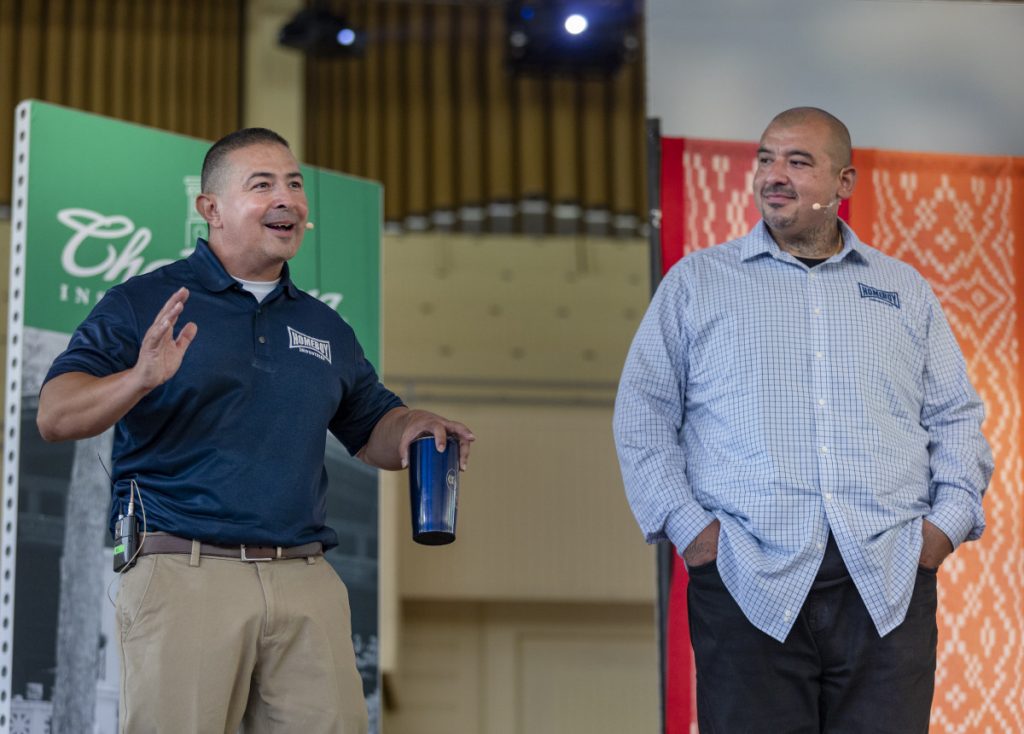
Avalos was 34 then, having spent half of his life behind bars. He said Boyle was a blessing for him, and Homeboy Industries changed his life. There, Avalos began experiencing connections. For the first time in his life, he was laughing.
Now a leader at Homeboy like Arellano, Avalos recalled a man who spent as much of his life in jail as he had, except he’d also struggled with addiction. He cycled through a couple of programs with Homeboy, and he sat in front of Avalos trying to explain himself.
Avalos kept reassuring that he would be fine, but the man kept talking. This repeated several times, and Avalos got more frustrated. Then he realized the man was emotional.
“I was looking at him with sympathy, not empathy,” he said. “What I realized was he already knew we had him. For the first time in his life, he was telling me his truth, but I wasn’t listening. I was only hearing.”
Instead, he said, empathy is about connection and allowing space to find that connection.
While in prison, one woman regularly visited his stepfather. Her own dad was jailed for 18 years and died when he was released. She vowed that she would become a lawyer and get Avalos’ stepfather out of prison.
“She did the bar and failed every single time, and I was like, ‘This lady ain’t gonna be no lawyer,’ ” he said, drawing a laugh from the crowd.
Seven years later, however, she passed.
“She was the one who got my father out on compassionate release, and she got me out of prison,” he said.
~~~
Both Arellanos and Avalos closed with gratitude to Chautauqua.
“There’s something I feel here in Chautauqua,” Arellanos said. “You guys make us feel like we’re a part of you, and that’s special, and that’s divine and that’s holy.”
Avalos said Chautauqua’s inclusivity with religions and people creates a safe space.
“When you’re in a safe place, you can find out the truth about who you truly are,” he said. “And when you begin there, everything in your life will begin to change.”


